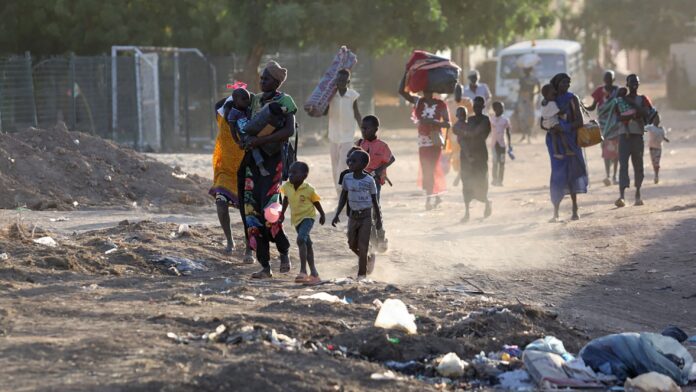Air strikes, street battles and artillery fire shook Sudan’s capital Khartoum and the major southern city of El-Obeid on Thursday, witnesses told AFP.
“Artillery fire targeted paramilitary bases of the Rapid Support Forces,” said a resident of El-Obeid, 350 kilometres (220 miles) southwest of Khartoum.
Fighting between the RSF and the regular army, led by feuding generals, has killed at least 3,000 people and displaced more than 3.3 million since April 15.
Army jets on Thursday were striking paramilitaries, who were responding with anti-aircraft fire, said another El-Obeid resident, who asked not to be named for security reasons.
In Khartoum’s south, witnesses reported three air raids in the early morning.
“The blasts were terrifying,” one of them told AFP.
The army on Wednesday accused the RSF of targeting a residential area of the capital in a drone strike that left “14 civilians dead and 15 injured”.
Residents told AFP at least 13 civilians were killed.
The conflict pits army chief Abdel Fattah al-Burhan against his former deputy, RSF commander Mohamed Hamdan Daglo.
– ‘Victory or martyrdom’ –
Burhan on Tuesday appeared in rare video footage shortly after an audio recording of Daglo was released.
In the video clip of less than one minute, Burhan, carrying a pistol and an automatic rifle, and donning a T-shirt and cargo pants, is seen in the army headquarters as he greets the army top brass.
The massive complex in central Khartoum has been the site of frequent clashes between the warring sides.
Daglo was last seen in a short video clip the paramilitaries shot in the early days of the conflict that is now in its fourth month.
But he has released several audio recordings since, the latest on Monday evening in which he told Sudanese he was willing to “choose peace” but remained “ready for war”.
The combatants loyal to him would fight until “victory or martyrdom”, Daglo said.
The RSF chief also mentioned the vast western region of Darfur, which in the early 2000s saw a bloody war and which has been hit by some of the worst violence in the new conflict.
The paramilitaries have labelled the Darfur bloodshed “tribal conflicts”, while rights campaigners blame the RSF and allied Arab militias for reported atrocities including rape, looting and the mass killings of ethnic minorities.
The International Criminal Court has opened a new probe into alleged war crimes in Darfur, its chief prosecutor Karim Khan said last week.
He warned against “allowing history to repeat itself” in Darfur, where 300,000 people were killed in a conflict from 2003 that led the ICC to charge former leader Omar al-Bashir with genocide.



